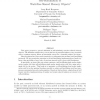Free Online Productivity Tools
i2Speak
i2Symbol
i2OCR
iTex2Img
iWeb2Print
iWeb2Shot
i2Type
iPdf2Split
iPdf2Merge
i2Bopomofo
i2Arabic
i2Style
i2Image
i2PDF
iLatex2Rtf
Sci2ools
WDAG
1995
Springer
1995
Springer
Self-Stabilization of Wait-Free Shared Memory Objects
This paper proposes a general definition of self-stabilizing wait-free shared memory objects. The definition ensures that, even in the face of processor failures, every execution after a transient memory failure is linearisable except for a bounded number of actions. Shared registers have been used extensively as communication medium in self-stabilizing protocols. We give particular attention to the self-stabilizing implementation of such registers, thus providing a large body of previous research with a more solid fundament. In particular, we prove that one cannot construct a self-stabilizing single-reader singlewriter regular bit from self-stabilizing single-reader single-writer safe bits, using only a single bit for the writer. This leads us to postulate a self-stabilizing dual-reader singlewriter safe bit as the minimal hardware needed to achieve self-stabilizing wait-free interprocess communication and synchronisation. Based on this hardware, adaptations of well known wait-free...
Algorithms | Self-stabilizing Implementation | Self-stabilizing Protocols | Self-stabilizing Single-reader Singlewriter | WDAG 1995 |
| Added | 26 Aug 2010 |
| Updated | 26 Aug 2010 |
| Type | Conference |
| Year | 1995 |
| Where | WDAG |
| Authors | Jaap-Henk Hoepman, Marina Papatriantafilou, Philippas Tsigas |
Comments (0)

